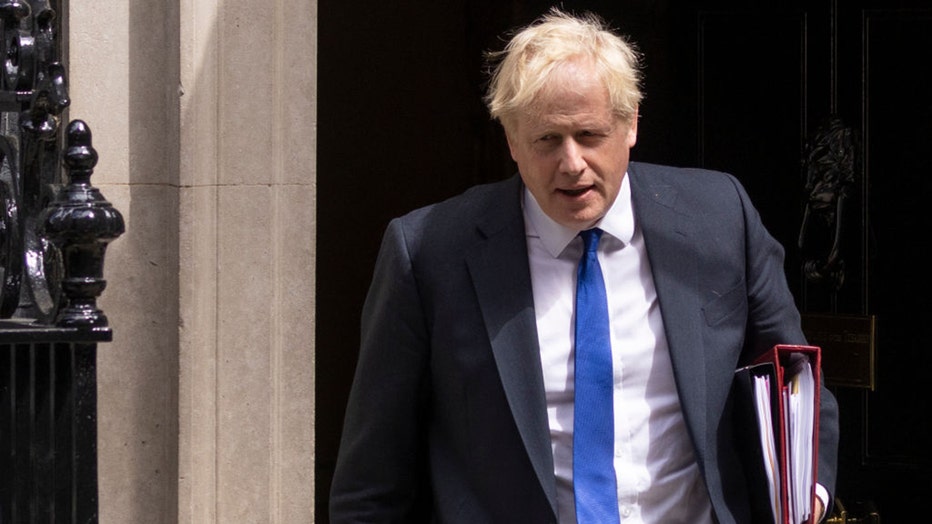British Prime Minister Boris Johnson announces resignation

Boris Johnson to resign
British Prime Minister Boris Johnson has agreed to resign, ending an unprecedented political crisis over his future.
NEW YORK - British Prime Minister Boris Johnson announced his resignation Thursday saying it was 'clearly the will' of the Conservative Party that there should be a new leader. The move comes after days of defections that crippled the controversial leader and left him unable to govern.
Speaking from outside 10 Downing Street, Johnson said he would remain as prime minister while a leadership contest was held to choose his successor.
Critics said he should not be allowed to remain as caretaker prime minister and he should be removed from office as soon as possible.
Johnson finally agreed to step down after one of his closest allies, Treasury Chief Nadhim Zahawi, told the prime minister to resign for the good of the country.
Get breaking news alerts in the free FOX5NY News app! | Sign up for FOX 5 email newsletters
"Prime Minister: this is not sustainable and it will only get worse: for you, for the Conservative Party and most importantly of all the country," Zahawi said in a letter to Johnson. "You must do the right thing and go now."
Zahawi’s intervention came after two more members of Johnson’s Cabinet resigned, along with three junior officials, pushing the number of those who have left the government this week past 50.
RELATED: Boris Johnson: From Brexit to Partygate, a timeline of UK prime minister's career
Johnson on Wednesday rejected calls to resign, arguing that he had a mandate from the voters to remain in office. But by Thursday morning the man who has built a reputation for wriggling out of political controversies was forced to admit the reality of his situation.
Bernard Jenkin, a senior Conservative Party lawmaker, said he met with Johnson on Wednesday and advised him to stand down.
"I just said to him, ‘Look, it’s just when you go now, and it’s how you go. You can go with some dignity or you can be forced out like Donald Trump, clinging to power and pretending he’s won the election when he’s lost,’’ Jenkin told the BBC before Johnson agreed to resign.
Johnson, 58, managed to remain in power for almost three years, despite allegations that he was too close to party donors, that he protected supporters from bullying and corruption allegations, and that he misled Parliament and was dishonest to the public about government office parties that broke pandemic lockdown rules.

LONDON, ENGLAND - JULY 06: Prime Minister Boris Johnson leaves 10 Downing Street for PMQ's on July 6, 2022 in London, England. (Photo by Dan Kitwood/Getty Images)
But recent disclosures that Johnson knew about sexual misconduct allegations against Chris Pincher, a Conservative lawmaker, before he promoted Pincher to a senior position turned out to be the last straw.
Last week, Pincher resigned as deputy chief whip after complaints he groped two men at a private club. That triggered a series of reports about past allegations leveled against Pincher — and shifting explanations from the government about what Johnson knew when he tapped him for a senior job enforcing party discipline.
Health Secretary Sajid Javid and Treasury chief Rishi Sunak resigned within minutes of each other Wednesday over the scandal. The two Cabinet heavyweights were responsible for tackling two of the biggest issues facing Britain — the cost-of-living crisis and COVID-19.
Javid captured the mood of many lawmakers when he said Johnson’s actions threatened to undermine the integrity of the Conservative Party and the British government.
RELATED: Boris Johnson's pecs would be a 'disgusting sight,' Putin says
"At some point we have to conclude that enough is enough," he told fellow lawmakers Wednesday. "I believe that point is now."
Welsh Secretary Simon Hart resigned on Wednesday, and Northern Ireland Secretary Brandon Lewis followed suite early Thursday, telling Johnson in his resignation letter that "we are ... past the point of no return. I cannot sacrifice my personal integrity to defend things as they stand now." He was later followed by Education Secretary Michelle Donelan, who was only appointed to her post on Tuesday to replace Zahawi.
Johnson had attempted to defy the mathematics of parliamentary government and the traditions of British politics. It is rare for a prime minister to cling to power in the face of this much pressure from his Cabinet colleagues.
The closest parallel may be Margaret Thatcher, the long-time Conservative prime minister who in 1990 sought to remain in office after her authority was undermined by disagreements over Britain’s relationship with what is now known as the European Union. But even she decided to resign after a number of Cabinet ministers told her it would be better for the party if she stepped aside.
George Freeman, who quit as science minister on Thursday, tweeted that "Boris Johnson needs to hand in the seals of office, apologise to Her Majesty (Queen Elizabeth II) and advise her to call for a caretaker prime minister. To take over today so that ministers can get back to work and we can choose a new Conservative leader to try and repair the damage and rebuild trust."
With the Associated Press

